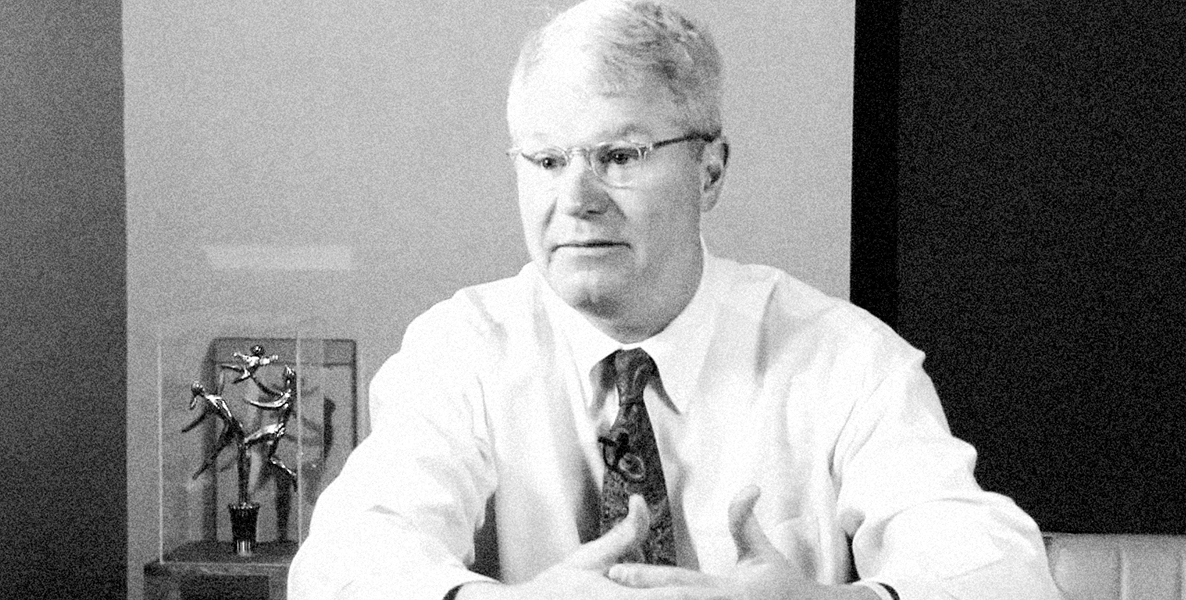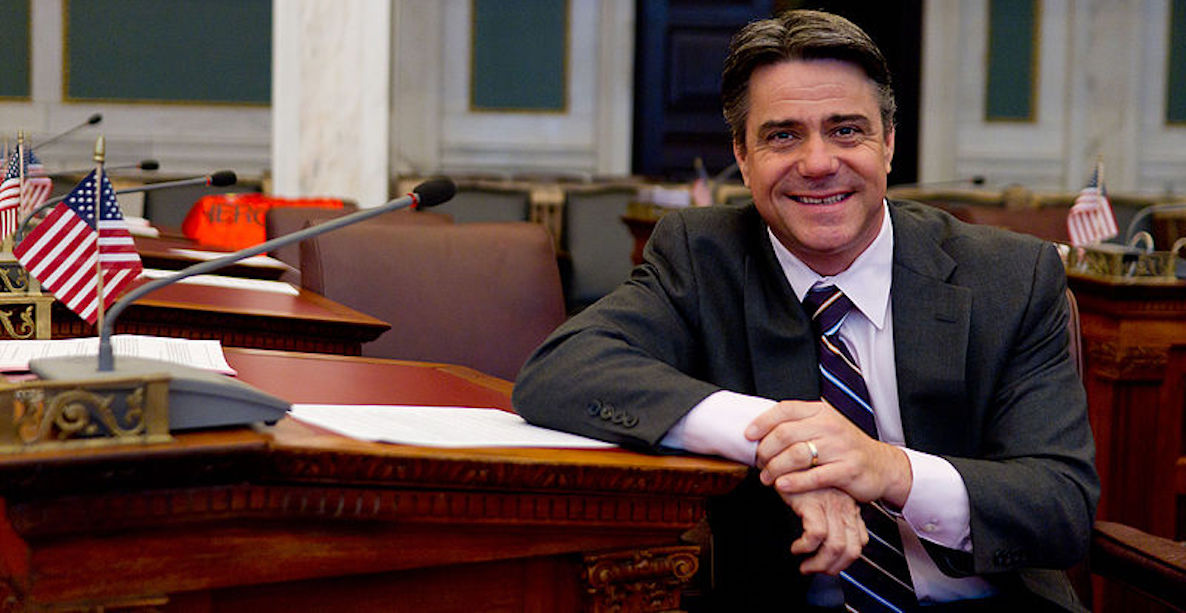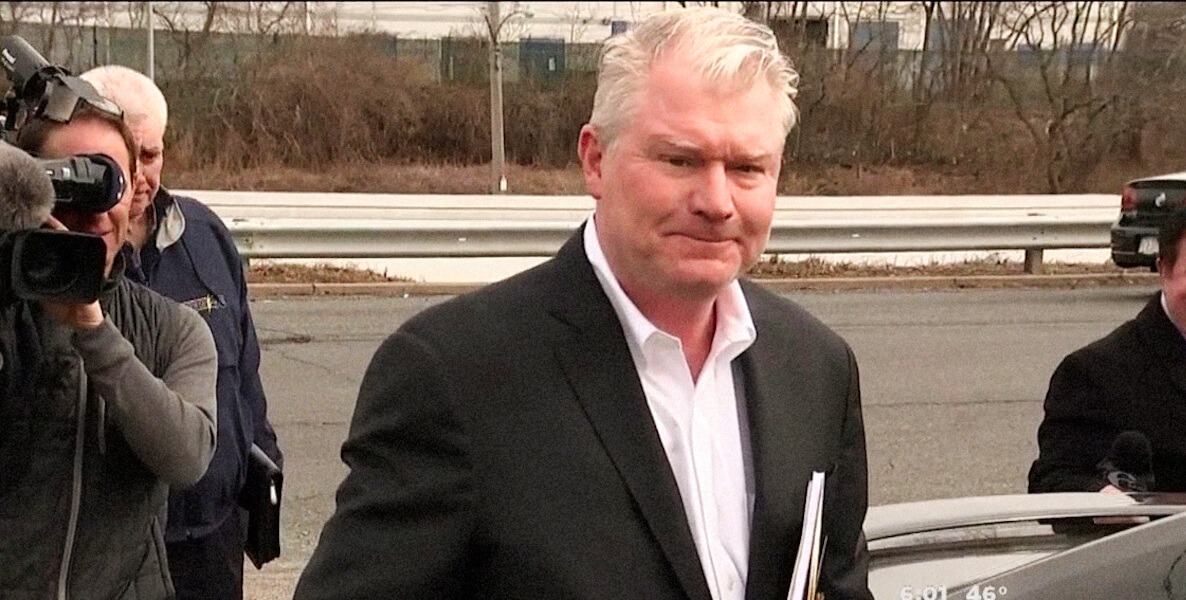About a week before the indictments that shook the Philly political landscape, labor leader John Dougherty approached numerous local TV news stations, offering himself up to be interviewed. Most passed; Fox 29 took him up on the offer. Now, of course, we know why Doc was uncharacteristically looking to be heard: He knew, or had an inkling, that the indictment was imminent. He was looking to get out ahead of it.
“Some people are vindictive,” he told reporter Hank Flynn in a two-part series. “Most people just don’t understand my industry and I play with a lot of powerful people who aren’t fond of me. A lot of people in this town—most of the greedy elite—they don’t think much of me, okay? I’m white trash to them guys.”
Many of us were puzzled by the appearance, but now, in the aftermath of the indictment, it all makes sense. Dougherty was previewing his defense, pitching himself as the victim of a class-based vendetta. It’s a type of jury nullification, and it has an eerie resemblance to the resentment-fueled spin tactics of both Donald Trump and Jim Kenney. Rather than engage on the facts, you attack the motives of those who are presenting them. To Trump, Robert Mueller and his investigators are “angry Democrats.” To Kenney, those who point out the regressiveness of his soda tax are shills for “Big Soda.” And to Dougherty and Henon, federal prosecutors are elitists who have it in for working folk.
![]()
After the indictment came out, I found myself discussing it on Inside Story, Channel 6’s Sunday morning public affairs show. To her credit, fellow guest Donna Gentile O’Donnell prefaced her defense of him by copping to her close relationship with Dougherty. In that defense, she doubled down on the argument Doc had previewed on Fox29, positing that he’d be much more beloved by the establishment—and maybe not even prosecuted—“if he had been to the manor born and not Pennsport born.”
Within a day, the very able criminal defense attorney, Brian McMonagle, representing Henon, was singing from the same hymn book. “If you look around this city, you’ll see a lot of skyscrapers,” McMonagle said. “They’re not built by robots. They’re built by hard-working union men and women. Unfortunately, yesterday’s indictment is a reflection of the fact that the government wants to make sure that the political power in this city stays inside those buildings, and not with the men and women who built them.”
Let’s just slow down here and call out some BS. Are we really to believe that the Obama Justice Department embarked on a class-based vendetta when it opened the investigation into Dougherty and Henon back in 2016? That Eric Holder had it in for Dougherty and Henon because they represent working men and women? Seriously?
That’s the savior of the working class, eager to put 100 union members out of work? Men with families and bills to pay? It can only lead to one conclusion: That John Dougherty has always been more about power than principle.
Besides, the Doc I know? Not sure he’s exactly straight outta the pages of Grapes of Wrath. He went to St. Joe’s Prep, a prestigious private school that has likely produced more elite leadership in this town than any other, including Michael Nutter, Jim Kenney and Vince Fumo. His grandfather was the majority leader of the state House. The Doc I’ve known for 15 years loved being a macher, wearing bespoke suits, hanging at the Palm, exercising power for power’s sake. In other words: A card carrying member of the elite that he now claims to have been out to get him all the while.
What we’re seeing in the Doc narrative arc isn’t really new. The 20th Century was replete with tales of union bosses who ended up betraying their working class roots. Robert Kennedy’s 1960 book The Enemy Within: The McClellan Committee’s Crusade Against Jimmy Hoffa and Corrupt Labor Unions tells many of those stories, including the fall of my late great uncle, Lloyd Klenert, the head of the United Textile Workers of America in the 1950s. After a while, Klenert, like so many other labor leaders, began to think of union funds as his money. I’ve built this union into what it is, they rationalize, self-justifying.
![]()
In a sign of just how much some things remain ever the same, many of the charges laid out against labor leaders back then seem identical to those in the Dougherty indictment. Case in point: Kennedy’s investigation and ultimate corruption conviction of Klenert revealed that my uncle had used union funds for a down payment on a house, for my aunt’s brassières, and for $2,564.65 for 24 “My Fair Lady” theater parties. (I think my mom was at some of them).
Like Klenert and all those Kennedy wrote about and ultimately put away, you have to wonder: How committed is this Doc, the one who has spent the last 20 years as kingmaker and inside player, to working class people, and working class values? I have no doubt that when those close to Dougherty say he enjoys the support of his rank and file they’re telling the truth. After all, under Doc, they’ve consistently been not only employed but highly paid. But even so, if what the indictment alleges is true—that he stole some $600,000 from his own members, which doesn’t even count the nearly $300,000 he paid back when the Feds first started looking at him three years ago—it will be hard to shrug off such seeming hypocrisy, no?
According to the indictment, Dougherty pushed for the soda tax in order to settle a score against the Teamsters union, which had run an ad in 2015 that hurt his feelings. Dougherty tells a union official colleague, “Let me tell you what Bobby Henon’s going to do, and he’s already talked to [elected local public official]…They’re going to start to put a tax on soda again, and that will cost the Teamsters 100 jobs in Philly.”
The only way our politics will change is if we start to feel like we’re constantly being ripped off. That would require learning more about the reach of the game being played against us, which means asking: Who else besides Henon was doing Dougherty’s bidding? How much of Dougherty’s money did every councilperson and the Mayor take?
That’s the savior of the working class, eager to put 100 union members out of work? Men with families and bills to pay? It can only lead to one conclusion: That John Dougherty has always been more about power than principle. Since the indictment, there has been a lot of praise for Doc’s good works. Yes, he was very charitable. And, yes, he took on the Carpenter’s union to bring a modicum of labor peace to the Convention Center. And, yes, he was a voice for reform on the Delaware River Port Authority.
But motive matters, and even when the end was worthy, it can be argued that Dougherty was never totally about advancing the interests of the common man. That Convention Center move? Ed Rendell told Philly mag it was one part born of his feud with Carpenter boss Ed Coryell, and “four parts doing the right thing.” And some say his calls for reforming DRPA weren’t solely about enacting some much-needed transparency. It was also about settling some scores having to do with being denied patronage jobs. Again, there’s nothing wrong with that: Dougherty has always practiced hard ball labor politics. Just don’t tell us you’re a modern-day Eugene Debs, hero to the working class—and that’s why the Feds are on your case.
More important than what happens to Dougherty in the courtroom is what happens next politically now that he’s fallen. In the last week, I spoke to one powerful insider who said that Dougherty’s indictment jeopardizes Mayor Kenney’s reelection bid. “There goes Jimmy’s money,” he said, which could set the stage for what I have to consider an unlikely scenario: One of those shadowy independent expenditure groups that spends big bucks to blanket the airwaves with negative ads about the mayor, softening him up for a challenge from a self-funded candidate.
But another prominent insider took a dissenting view. “Nothing will happen,” he told me. “Because people don’t care.”
The Doc I’ve known for 15 years loved being a macher, wearing bespoke suits, hanging at the Palm, exercising power for power’s sake. In other words: A card carrying member of the elite that he now claims to have been out to get him all the while.
And that’s what I keep coming back to: Our passive acceptance of corruption. The late Jeremy Nowak once argued that we pay a de facto corruption tax, and he unearthed a study from researchers at Indiana University and the City University of Hong Kong that found that if states such as Pennsylvania were just at an average corruption level, it would result in savings of about $1,300 per resident per year.
The only way our politics will change is if we start to feel like we’re constantly being ripped off. That would require learning more about the reach of the game being played against us, which means asking: Who else besides Henon was doing Dougherty’s bidding? How much of Dougherty’s money did you take, we should ask of every councilperson and the Mayor, and what did you have to do in return? After all, we know that the Mayor put Dougherty’s chiropractor friend in charge of zoning before the guy’s office was raided and he was ultimately indicted. And we know that this is the same Mayor who has never met a tax he didn’t want to enact—except for the 1 percent tax on new construction that Dougherty so vociferously opposed. Maybe, if Dougherty is convicted, every elected official who took Doc’s money should give it all back—or give it to the school district.
![]()
Let me be clear: A court will decide whether what Dougherty did with union funds was legal or not. But we know it’s not illegal to put the dude giving Doc back rubs on the zoning board, or to support a tax at a labor leader’s behest. Happens all the time. We should know the intricacies of the deals and schemes that inform our public policy, the better to have a conversation that asks if our government squares with our values.
Ultimately, a jury will do its work. But here in the court of public opinion, our job is to cut through the spin and make sure we focus on the facts—and not on jury pool appeals to personal biases and class-based resentments.
John Dougherty





